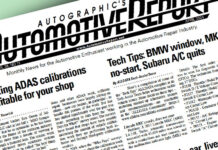It’s been a year since Automotive Report offered a look into some of the legal battles being waged in the industry. Some of the lawsuits have continued, some have concluded, and some new ones — involving steering, non-OEM parts, alleged conspiracies and more — have cropped up. Here’s your legal scorecard to bring you up-to-date.
Shop wins — but not financially
Talk to shops who have taken on insurance companies in court, and you sometimes hear, “It’s not the money; it’s the principle.” Being on the winning side of a court battle can feel good, even if the financial cost of doing so can be high.
Pennsylvania shop owner Tim Kilkeary is the first to admit that spending almost $10,000 and 18 months on his legal fight with an insurer to receive a $156 settlement may not seem like a logical business decision, but he stands by it.
“I tend to make a lot of decisions based on principle,” Kilkeary admits. “I know I’m right, and I wasn’t going to let them get out from under paying it.”
Kilkeary’s Auto Body sued Travelers Insurance in order to retain the parts mark-up that Kilkeary says the shop earned on an aftermarket part it tried to use at the insurer’s behest. The fit of the part, a bumper for a 2006 Dodge pick-up, wasn’t acceptable to the customer, Kilkeary said, and Travelers agreed to have the shop install an OEM part instead. Kilkeary said in such cases, the insurer is entitled to a refund of what the shop paid for the non-OEM part but not the full list price.
“My position is that if I order it, receive it, check it in, warehouse it and dispatch it, all of that mark-up money is there to pay for that process,” Kilkeary said. “I’ll play ball with you and order the part based on your requirement, but if I go through all that work, you’re not getting all of your money back. That mark-up has been earned.”
Kilkeary said after more than a year of legal wrangling, Travelers issued him payment. He said that although the expense he went to may not pencil out for his 22-employee business, he wants insurers to know “we are not going to take ‘no’ for an answer.” He said when he told an adjustor about the settlement this spring, the adjustor said he would rescind his push for the shop to use a non-OEM part on a particular vehicle.
“It was their decision,” Kilkeary said of Travelers’ push for the non-OEM part that led to his lawsuit. “They need to stand behind their decision.”
Headed to the Supreme Court?
What might be the first case related to the industry to reach the U.S. Supreme Court is now awaiting a decision by that court as to whether it will accept the case for review.
Louisiana-based Felder’s Collision Parts, a distributor of non-OEM parts, is asking the U.S. Supreme Court to revive Felder’s lawsuit challenging the legality of General Motor’s “Bump the Competition” parts price-matching program.
A federal appeals court in January upheld a lower court’s dismissal of the case, in which Felder’s argued that the GM program was predatory and anti-competitive in that it enabled GM dealers to sell parts below their cost. The lower court found that, as part of the program, even if a dealer sold a part for less than it originally paid GM, the automaker would rebate the dealer enough money to ensure the dealer made a profit on the part.
“Felder’s never alleged that GM is selling parts below its costs,” but rather only that the dealers are, the Appeals Court agreed in upholding dismissal of the suit.
But Felder’s has now petitioned the Supreme Court to address whether the lower courts should have taken the after-sale rebates into account — or should have focused only on the point-of-sale pricing when ruling on the predatory pricing allegations. If the Supreme Court elects not to hear the case, the lower court’s dismissal will stand.
The Automotive Body Parts Association (ABPA) has written a “friend of the court” brief to the U.S. Supreme Court, urging that court to revive the lawsuit.
“It is not merely competitors that are being eliminated by GM’s ‘Bump the Competition’ program,” the ABPA said in its brief. “It is competition that is being eliminated.”
Court date set in Tennessee MSO’s suit
A trial date of September 20 has been set in the lawsuit brought against Progressive Insurance by Price’s Collision Center, a multi-shop operation in Tennessee.
Price’s originally filed the lawsuit in 2012 to collect unpaid repair costs from the insurer (breach of contract) and claiming that the insurer steered customers away from Price’s Collision (tortious interference).
The suit arose from accidents in June of 2011 in which two vehicles driven by Progressive insureds were damaged. The two vehicles were inspected by a Progressive adjuster who wrote initial estimates for repairs. Both customers subsequently brought their vehicles to Price’s.
Price’s sued in July 2012, alleging that Progressive repeatedly refused to pay the full cost of repairs to the vehicles, leaving the drivers responsible for paying the difference. Price’s obtained “assignment of proceeds” from the two customers, essentially allowing Price’s to sue Progressive for the unpaid balances on behalf of the insureds.
A judgment was entered in Price’s favor in a county court, and Progressive, which has denied the allegations in the suit, appealed the decision and was successful in having the case moved to U.S. District Court in Tennessee. That court, however, in late 2013 denied Progressive’s motion to dismiss the case.
Last year, Progressive tried unsuccessfully to have the case transferred from that Tennessee court to the same federal court in Florida handling two dozen other lawsuits brought by shops in multiple states against insurance companies (see below); Price’s successfully argued that its suit differs from those other suits in that it does not allege a conspiracy among insurers, and so the case continues in Tennessee.
Discovery in the lawsuit has included the exchange of thousands of documents between Progressive and Price’s. One of those documents includes a September 2014 affidavit of David Edwards, a former 17-year employee of Progressive who testifies that he heard Progressive employees “saying derogatory things about Price’s Collision Centers to the insureds and/or claimants.”
He also says that he was “specifically prohibited from placing Price’s in the [DRP] network,” and that Progressive’s inside adjusters “were evaluated on the percentage of insureds and claimants that bring their vehicles to in-network shops.”
Future of OEM patents on the line
Another important lawsuit that could conceivably have a big impact on the use of non-OEM parts is one Automotive Report wrote about last year. The ABPA, which represents non-OEM parts manufacturers and distributors, filed suit in late 2013 against Ford, seeking to have the automaker’s design patents covering automotive crash parts — which limit the production and sale of non-OEM versions of those parts — ruled invalid and unenforceable.
The ABPA argues the parts are “functional” rather than “ornamental,” and thus should not be protected by “design” patents. It cites cases in which design patents on items such as toner cartridges were ruled invalid because the design was found to be primarily functional.
Much of the argument in the case this year has been more procedural than focused on the merits of the suit. In early January, for example, Ford was successful in convincing the federal court in Texas where ABPA filed the suit to transfer the case to a court in the automaker’s home state of Michigan, a transfer that happened in mid-January.
But the ABPA now argues that court rules in Texas say the case should not been moved until 21 days after the transfer was ordered, so the transfer prior to January 29 was “premature and void.”
“Obviously we would rather go in front of a jury in Texas to make this argument than a jury in Michigan, where all the car companies are based,” Dan Morrissey, chairman of the ABPA, said.
Speaking at the ABPA conference this past April, Morrissey said the significance of the association’s lawsuit against Ford can’t be overstated.
“If we do nothing, it’s only a matter of time before the car companies use the design patents to eliminate competition,” Morrissey said. But if the association lawsuit is successful, he said, it would eliminate all auto manufacturer design patents on crash parts.
“So the stakes are high,” he said.
Multi-state lawsuits slog forward
Perhaps the biggest legal battle that started last year and continues this summer are the two dozen lawsuits brought by shops in 18 states (including Alabama, Kentucky, Louisiana, Mississippi and Tennessee) alleging that multiple insurance companies have conspired to manipulate labor rates and other shop charges in order to reduce costs.
Most of the suits allege that State Farm is at the heart of an effort by the insurers to suppress labor rates, coerce shops into accepting less than actual or market costs for materials, refuse to pay for a list of required procedures, and punish non-compliant shops through steering.
The suits allege these actions constitute tortious interference, unjust enrichment and violation of Sherman Act price-fixing and boycotting prohibitions. They seek unspecified compensatory and punitive damages.
The suits have all been consolidated in a federal court in Florida in an effort to eliminate duplication of legal processes in the cases or result in contradictory rulings.
Most of the action in the cases this year has involved the insurers arguing — so far successfully — that the lawsuits should be dismissed.
In the suit filed in U.S. District Court in the Eastern District of Louisiana, for example, Geico this past June argued the lawsuit lacks facts to demonstrate the existence of a conspiracy among the insurers, or that Geico joined any such conspiracy. The shops, Geico argues, try to demonstrate the conspiracy by showing “parallel conduct” by the insurers, yet the lawsuit also shows the insurers “have unique systems for estimating and specifying parts.”
In the similar lawsuit filed in the other U.S. District Court in Louisiana, Progressive, Nationwide, Farmers and several other insurers jointly filed a motion to dismiss. They note that although the suit was brought by 40 shops, it offers specific information on the prices paid by insurers to only three of those shops, and even that information is for different years for each of the three shops.
“From this sparse and unconnected price information, [the shops] would ask the Court to imagine parallel pricing activity from which the Court could then infer a price-fixing agreement across the State of Louisiana for 20 years,” the insurers’ brief states.
But each time the court has tossed any of the cases, it made that dismissal “without prejudice,” meaning the shops can file an amended lawsuit to address the short-comings the court found in their legal arguments — something they have done in state after state.
That back-and-forth wrangling will continue this year until the court eventually allows the amended lawsuits to proceed — or dismisses them “with prejudice.”
One other aspect of the suits that could be decided this year involves the effort by some insurers in the lawsuit brought by Florida shops to have the court levy penalties against the shops. Old Republic Insurance Company argued the sanctions are appropriate because the lawsuit is “frivolous and without merit with respect to Old Republic” in no small part because Old Republic doesn’t even sell private passenger auto insurance in Florida.
But the shops argue Old Republic’s motion for sanctions reads more like an argument for why the insurer should be dismissed from the lawsuit, and that the insurer seems to feel that the shops’ refusal to dismiss the insurer is adequate grounds for sanctions.
Florida Farm Bureau General Insurance also is seeking sanctions — including attorney’s fees — against the shops and their attorneys.
What happens in these lawsuits in the coming few months could largely determine whether they will still be included in Automotive Report’s examination of legal battles in the industry at this time next year. •



